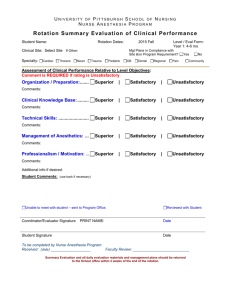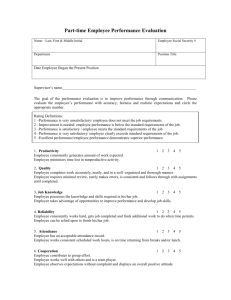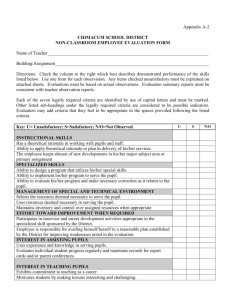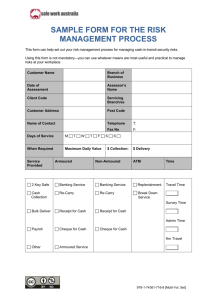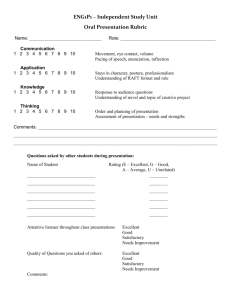Sample Assignment #5 Case Study of an ESL Student Case
advertisement
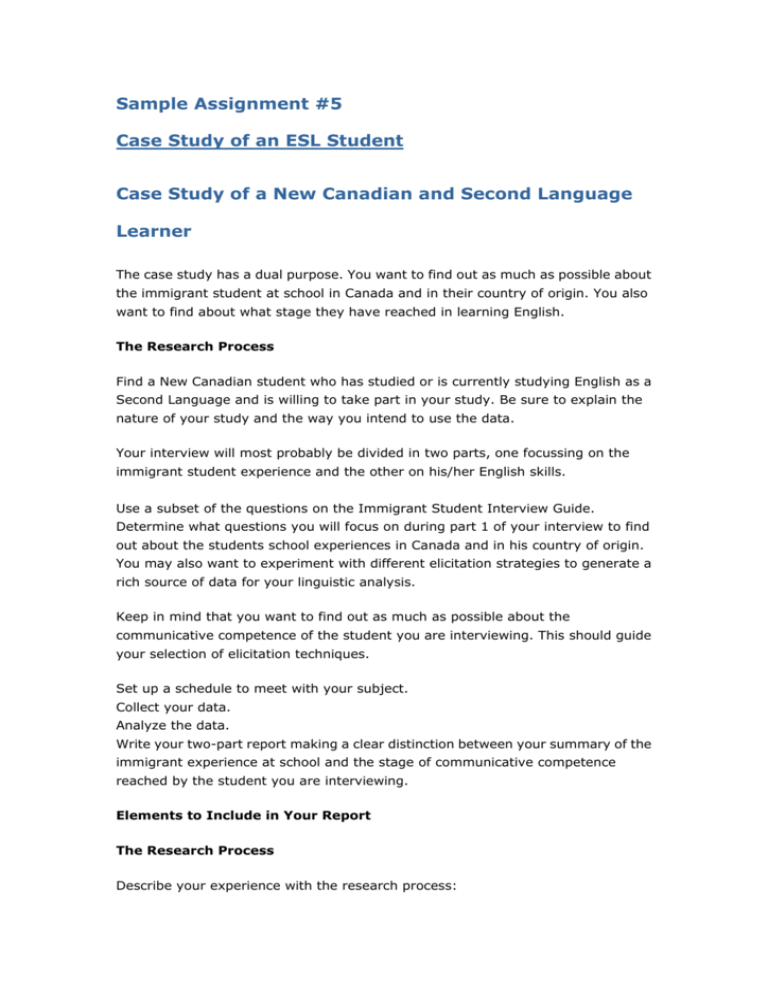
Sample Assignment #5 Case Study of an ESL Student Case Study of a New Canadian and Second Language Learner The case study has a dual purpose. You want to find out as much as possible about the immigrant student at school in Canada and in their country of origin. You also want to find about what stage they have reached in learning English. The Research Process Find a New Canadian student who has studied or is currently studying English as a Second Language and is willing to take part in your study. Be sure to explain the nature of your study and the way you intend to use the data. Your interview will most probably be divided in two parts, one focussing on the immigrant student experience and the other on his/her English skills. Use a subset of the questions on the Immigrant Student Interview Guide. Determine what questions you will focus on during part 1 of your interview to find out about the students school experiences in Canada and in his country of origin. You may also want to experiment with different elicitation strategies to generate a rich source of data for your linguistic analysis. Keep in mind that you want to find out as much as possible about the communicative competence of the student you are interviewing. This should guide your selection of elicitation techniques. Set up a schedule to meet with your subject. Collect your data. Analyze the data. Write your two-part report making a clear distinction between your summary of the immigrant experience at school and the stage of communicative competence reached by the student you are interviewing. Elements to Include in Your Report The Research Process Describe your experience with the research process: • How did you find the student you interviewed? • How did you go about getting permission to conduct your study? • When you did you conduct the interview? • What elicitation techniques did you use in Part 2 of the interview? • What other data did you collect? Writing Samples? A report card? • How did you decide what data to transcribe? Part 1 Write a summary of your findings on the following topics using direct quotes when appropriate: Basic background information (add information on first language, proficiency in the first language, other languages, and proficiency in other languages) • Pre-Canada information • The journey • School experiences before coming to Canada • School experiences in Canada • Current school experiences • Social aspects of school • School achievement • The immigrant experience Discuss the implications of your findings for teaching. Part 2 Complete an analysis of the Part 2 interview data. Your goal is to determine the level of communicative competence reached by the student in English. Specific data must be used to support the conclusions drawn with regard to your subject's linguistic, sociolinguistic, discourse and strategic competencies. When describing the subject's linguistic competence examples of the mastery, partial mastery or non-mastery of the sound system, word order, vocabulary and grammar should be provided. When describing the subject's sociolinguistic competence examples describing the mastery, partial mastery or non-mastery of non-verbals, appropriateness of register, and knowledge of culture should be provided. When describing the subject's discourse competence examples describing the mastery, partial mastery or non-mastery of coherence and cohesion in speech and/or writing should be provided. When describing the subject's strategic competence examples describing the mastery, partial mastery or non-mastery of strategies to overcome a breakdown in communication should be provided. Write a brief statement regarding the subject's overall competence. Discuss the implications of your findings for teaching CASE STUDY OF A NEW CANADIAN AND A SECOND LANGUAGE LEARNER EVALUATION FORM Name of Student(s): _________________________________ The following elements were included in the report submitted: A description of the research process Unsatisfactory Very satisfactory _________________________________________________________________ _ A summary of findings on the following topics using direct quotes when appropriate: Unsatisfactory Very satisfactory _________________________________________________________________ _ Basic background information (add information on first language, proficiency in the first language, other languages, and proficiency in other languages) Unsatisfactory Very satisfactory _________________________________________________________________ _ Pre-Canada information Unsatisfactory Very satisfactory _________________________________________________________________ _ The journey Unsatisfactory Very satisfactory _________________________________________________________________ _ School experiences before coming to Canada Unsatisfactory Very satisfactory _________________________________________________________________ _ School experiences in Canada Unsatisfactory Very satisfactory _________________________________________________________________ _ Current school experiences Unsatisfactory Very satisfactory _________________________________________________________________ _ Social aspects of school Unsatisfactory Very satisfactory _________________________________________________________________ _ School achievement Unsatisfactory Very satisfactory _________________________________________________________________ _ The immigrant experience Unsatisfactory Very satisfactory _________________________________________________________________ _ A discussion of the implications of the findings for teaching. Unsatisfactory Very satisfactory _________________________________________________________________ _ A transcription of selected data Unsatisfactory Very satisfactory _________________________________________________________________ _ Other data collected, e.g., writing sample Unsatisfactory Very satisfactory _________________________________________________________________ _ A description of the subject's linguistic competence with examples of the mastery,partial mastery or non-mastery of the sound system, word order, vocabulary and grammar Unsatisfactory Very satisfactory _________________________________________________________________ _ A description of the subject's sociolinguistic competence with examples of the mastery, partial mastery or non-mastery of non-verbals, appropriateness of register, and knowledge of culture Unsatisfactory Very satisfactory _________________________________________________________________ _ A description of the subject's discourse competence with examples of the mastery, partial mastery or non-mastery of coherence and cohesion in speech and/or writing Unsatisfactory Very satisfactory _________________________________________________________________ _ A description of the subject's strategic competence with examples of the mastery, partial mastery or non-mastery of strategies to overcome a breakdown in communication Unsatisfactory Very satisfactory _________________________________________________________________ _ A brief statement regarding the subject's overall competence Unsatisfactory Very satisfactory _________________________________________________________________ _ A discussion of the implications of the findings for teaching Unsatisfactory Very satisfactory _________________________________________________________________ _ GRADE: Immigrant Student Interview Guide Note to the interviewer: Before you begin the interview, introduce yourself and go over each of these points in your own words, stopping to answer any questions if necessary: 1. Identify yourself and your institutional affiliation (e.g., public school, college, or university). 2. Explain that you are especially interested in finding out how schools can help students who are new in this country-what kinds of things are helpful, and what kinds of things don't help. Indicate that this is why you are asking these questions of students. 3. Assure the student(s) that this information will only be used to help teachers better understand what immigrant students experience and need. Explain that names will not be used in reporting information to others. if they are quoted when the information is shared with others, their names will not be used. 4. Secure all appropriate permissions from parents and school before conducting any interviews. 5. Tell the students that they are free to stop you at any time in the interview If they have questions. Student Interview Guide Basic background information Let's begin with some basic information about you. 1. What nationality are you? 2. What is your birth date? 3. When did you enter Canada? 4. What grade are you in now? 5. What school do you go to? Pre-Canada information Now I'm going to ask you some questions about your life before you came to Canada. 6. In what country were you born? 7. Did you live in a city? town or in the country? 8. What work did your parents do? 9. How old were you when you left? 10. In your understanding, why did you leave? 11. Did you know when you left that you would be coming to Canada? (If not, at what point did you become aware of your destination?) The journey Now tell me about your journey from when you left your home until you arrived in Canada. 12. What family members or friends left with you? 13. How long did it take from when you left your home until you arrived in Canada? 14. Describe the journey to me. 15. Before you got here, what was your view of Canada and of what your life here would be like? School experience Let's go back again to your life before arriving in Canada and talk about your schooling then. 16. What language(s) was/were spoken at home before you came to Canada? 17. Did you know how to read and write in your own language before you came here? 18. Did you go to school before you came to Canada? (If no, skip to #20.) 19. How many years were you in school there? 20. Was school in your country different from school in Canada? In what ways? School experiences in Canada 21. How long after you arrived here in Canada did you enroll in school ? 22. What month/year did you start school ? 23. Who took you to register for school ? 24. What grade were you placed in? 25. In your opinion, did that seem to be the right grade for you? Why or why not? 26. How much English did you know when you first started school here? 27. If you were not fluent in English, who helped you to communicate and understand? 28. Tell me about your first year in school here in Canada. What was it like for you? 29. What subjects did you study in that first year? 30. Did anyone or anything help you get adjusted, feel comfortable, and learn at school during your first two years? 31. What was most difficult for you about school in the first two years? 32. What might have helped you? 33. What was the biggest help to you in learning English? Current school experiences 34. How do you feel about school now? 35. Are there still times when you do not understand what is being said or done at school because of English language difficulties? 36. What language(s) do you usually speak at home? 37. What language(s) do you usually speak with your friends? 38. Who do you go to for help with your schoolwork when you need it? Social aspects of school 39. Tell me about the genera relations between immigrant students and other students at you school. 40. Are most of your friends also immigrants from your country? Why? 41. Have you had any problems with other students because you are an immigrant? 42. Are there any divisions between recently arrived immigrants from your country and other students from the same country who have been here longer? If yes, describe. 43. Have you gotten into trouble at school? 44. Have you, or someone you know, been treated unfairly by teachers or other students because of language or nationality? If yes, how common do you think this is? 45. In general, do other students seem interested in your experiences and life before coming to Canada? 46. Do you live far enough from your school that you need to take a bus outside of your neighborhood to get to school? If yes, what is it like for you to go to school outside of your neighborhood? School achievement 47. How well do you do in school ? 48. What kind of grades do you get? 49. How many hours of homework do you do on average each school night? 50. What kind of courses do you generally take? 51. Were you ever enrolled in ESL classes? (If no, skip to #56.) 52. Did you feel adequately prepared when you switched from ESL classes to regular classes in English? 53. Have you ever considered dropping out of school ? If yes, why? 54. Do you think you will graduate from high school ? It no, why not? 55. How much do you worry about how you are doing in school? 56. Have you ever had to repeat a grade or a class? Why? 57. Do you have plans to go on to college? 58. What are the things you think school should teach a young person? 59. What do you think is important to learn in order to be successful in this country? 60. Do you feel you are learning what you need to know? 61. How has being an immigrant made your experiences at school different from other students who were born here? 62. What are your hopes for the future? 63. What are your plans for after high school ? 64. Have your parents ever been to your school? If yes, why? 65. Does your school have classes that teach you about your native country and culture? 66. Have you ever been involved in any of your classes as an educational resource to teach other students about your culture or about the immigration experience? 67. What do you feel you have to teach to Canada students because of your experiences from another culture and as an immigrant? 68. How do you think most people in Canada view immigrants? The immigrant experience As someone born in another country and culture, and now living in Canada, you are in a very unique position. You belong, in a sense, to two cultures. We are interested in what this means to you. 69. Are there ways you behave now and things you believe that are very different from the traditional ways in your country? 70. Are there things you do or new beliefs you have that upset your parents because they are different from traditional ways? 71. What, 4 anything, from your heritage and background do you want to pass along to your children? 72. Do you think about returning some day to your native country? Thank you Figure 4-1 Immigrant Student Interview Guide Source: From Crossing the schoolhouse border (pp. 118-121) by L. Olsen, 1988, San Francisco: California Tomorrow. Copyright 1988 by California Tomorrow. Adapted by permission. C+ B- B B+ A- A A+

